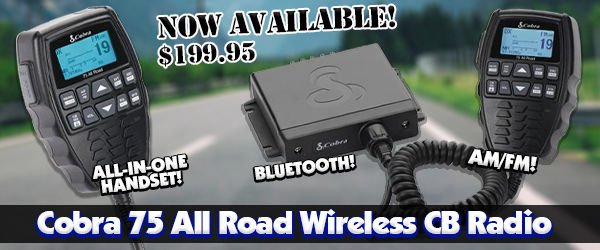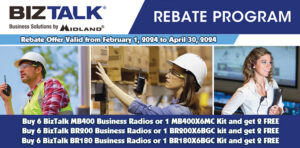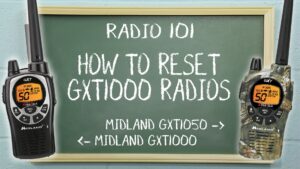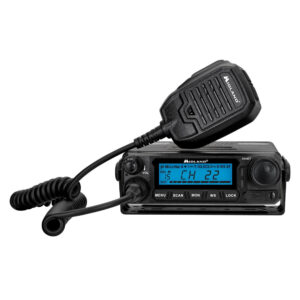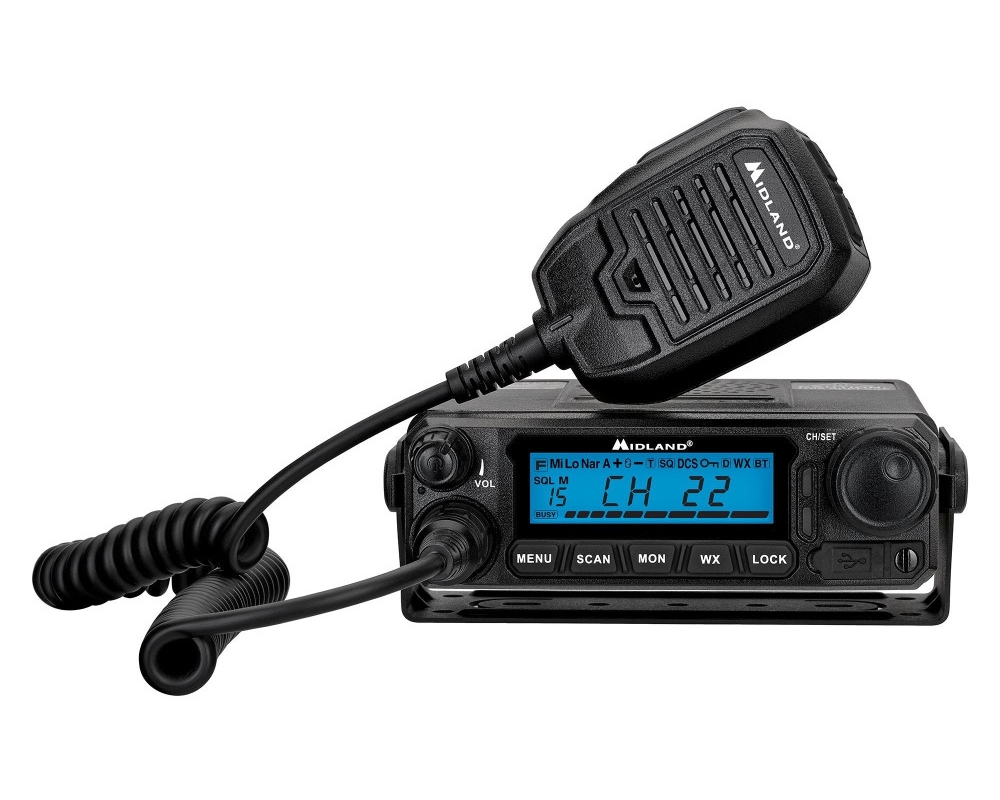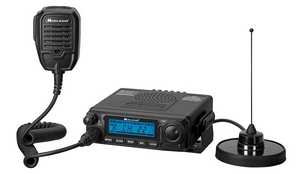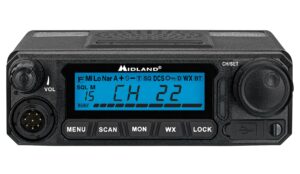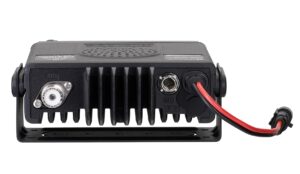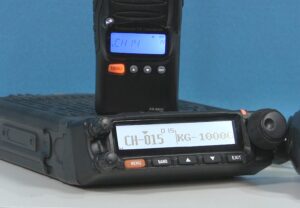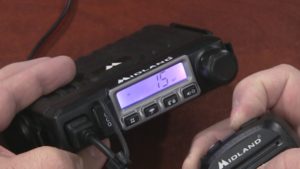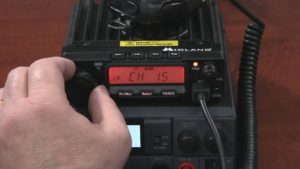 After its introduction in 2009, the Midland GXT1000VP4 quickly became an icon in the world of GMRS walkie talkies, and it remains so today. Much has been written about the GXT1000, and there is a multitude of articles, videos and podcasts that cover nearly every aspect of it.
After its introduction in 2009, the Midland GXT1000VP4 quickly became an icon in the world of GMRS walkie talkies, and it remains so today. Much has been written about the GXT1000, and there is a multitude of articles, videos and podcasts that cover nearly every aspect of it.
So it was no surprise that Midland would introduce another version of it, and in 2013 the company did so, with the GXT2000. It featured some notable improvements and was much anticipated by the GMRS community. Unfortunately, although the initial reviews were generally favorable, the product experienced delays due to production issues and was ultimately discontinued.
Yet the popularity of the GXT1000 never waned. Neither did the sales. With so much competition and innovation in the GMRS marketplace, the venerable GXT1000 is still holding its own. In fact, fifteen years later, it is still a top selling GMRS radio, and perhaps the most recognizable Midland product around. There's just one thing. It's showing its age.
Now Midland is giving their beloved flagship radio a makeover, with long requested updates and new functionality to bring it up to date with the needs of today's GMRS operator. Introducing the Midland GXT3000 GMRS Two Way Radio!
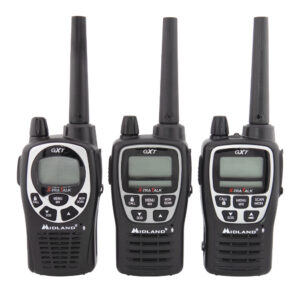 The first and natural inclination would be to draw comparisons between the GXT3000 and the original. After all, this radio is a new and improved version of the GXT1000, and many of the features included with each are the same. However, the 3000 actually has more in common with the now defunct GXT2000, especially in its overall design. Take a look at an image of the GXT2000VP4, compare it to an image of the GXT3000VP4, and you'll notice it right away. These two models look almost identical to one another.
The first and natural inclination would be to draw comparisons between the GXT3000 and the original. After all, this radio is a new and improved version of the GXT1000, and many of the features included with each are the same. However, the 3000 actually has more in common with the now defunct GXT2000, especially in its overall design. Take a look at an image of the GXT2000VP4, compare it to an image of the GXT3000VP4, and you'll notice it right away. These two models look almost identical to one another.
Appearance
In a side by side comparison, The GXT2000 and GXT3000 are nearly indistinguishable, right down to the LCD display that is "split" on the lower end to separate some of the function icons. They both have the same 5-key keypad as well, although the Arrow Up key on the GXT3000 also controls the flashlight, something the GXT2000 and GXT1000 don't have. The PTT, front speaker grille, and side audio port are all identical. Even the on/off/volume knob looks the same. Overall, the GXT2000 and GXT3000 have almost the same shell, with the same shape and size. There are, however, two exceptions. The GXT3000 has the already mentioned flashlight, and one additional port on the side of the radio. It's USB-C!
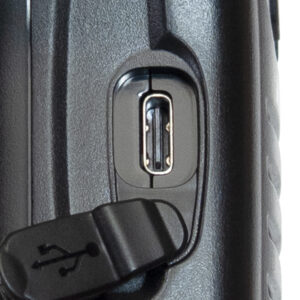 Battery and Charging Options
Battery and Charging Options
Each of the three models use different types of rechargeable batteries. The GXT1000 uses a BATT-5R NiMH rechargeable battery pack. The GXT2000 used a lithium polymer battery. The GXT3000 operates on a Lithium-ion battery pack. According to Midland, the battery can power the new radio for up to 18 hours. All three radios can also operate on AA alkaline batteries, although this was somewhat problematic on the GXT2000, which is possibly one factor that may have contributed to its demise.
As with the previous models, the GXT3000 includes a dual pocket desktop charger, which is still considered a primary charging option. All three radios can be charged using an optional DC vehicle adapter designed for that purpose. What sets the GXT3000 apart from the others is that it also supports USB charging via the USB-C port built into the side of the radio.
It should be noted that the desktop chargers are NOT compatible between the GXT1000, GXT2000 and GXT3000. Although the radios are roughly the same size and have the same footprint, the technology required to charge the different types of rechargeable batteries for each radio is different. The power plugs on the back of the chargers are also different. The GXT3000 charger uses a USB-C plug, so it isn't possible to use the same wall or vehicle plug from the other models anyway.
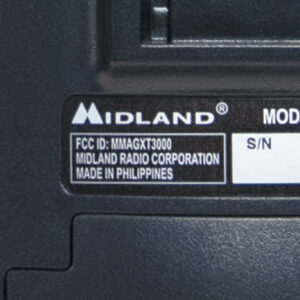 Transmit Power
Transmit Power
The GXT3000VP4 has its own FCC ID number. This typically means that there were some significant changes between all the previous models that Midland had to submit to the FCC for approval. Midland does not publish the actual wattage of its consumer radios on its site nor does it include this information on their spec sheets. This is where the FCC ID comes in handy. A simple lookup of the grant in the FCC database for the Part 95E certification reveals the actual wattage.
Based on the testing data submitted to the FCC, the GXT3000 has a maximum output power of 2.42 watts. In contrast, the wattage of the GXT1000 varies between 2.43, 2.5 and 5.33 watts, depending on which GXT1000 was tested. This is because there are several generations of the GXT1000 due to various updates and changes to it over time, each with its own FCC ID. The GXT2000 maxed out at 2.649 watts.
Receiver
Also, just in case anyone is interested, the GXT3000 has a superheterodyne receiver. While the advantages of a superhet receiver in a consumer transceiver might be debatable in this age of advanced chip technology, it may still serve to satiate the concerns and desires of a few GMRS radio enthusiasts nonetheless.
Core Functions
At its core, the GXT3000 is a bona fide GMRS radio. It can transmit and receive on all of the standard GMRS channels allocated to the service by the FCC, plus 38 "additional" channels that are pre-set with specific privacy tones. These are the same XTRA channels that the GXT1000 supports, although Midland apparently no longer calls them "XTRA". The GXT3000 also supports the same standard 38 CTCSS tones and 104 DCS codes as other Midland models, utilizing the same number code system to keep things copacetic across their product line. Nothing new there.
Repeater Capability
What is new in the GXT3000 is repeater support. Yes, that's right, by popular demand, the GXT3000 includes all 8 GMRS repeater channels for full, unfettered access to repeaters! This functionality has been available on the Midland mobiles for quite some time, but it is a new, refreshing and welcome addition to their GMRS portable handheld models.
Previously, those who relied primarily on GMRS repeaters but were loyal to the Midland brand were forced to settle for mixing their MXT series mobile radios with portable handhelds from other brands to make their system work. Not anymore. With the GXT3000, you can now have your repeater and transmit on it too, across your entire Midland branded fleet.
Weather Channels
Of course, it wouldn't be a top tier GXT Series radio without the weather channels and alerts, and the GXT3000 delivers. It features a built-in weather alert radio with 7 US NOAA weather channels plus 3 Canadian Marine frequencies, for a total of 10 weather related channels.
Features
The GXT3000 lists the same set of features as its predecessors. This includes 10 call tones, channel scan, dual channel watch, auto squelch, multiple power settings, battery saver, keypad lock, monitor function, silent operation, vibrate alert and VOX, for what that's worth. Like the other models, it is also JIS4 water resistant and has a three year manufacturer warranty.
To be unique, the GXT3000 also has an SOS siren, just in case you want or need one.
Group Mode
The GXT1000 has a direct call and a group mode feature, and Midland removed both of these in the GXT2000. Group Mode must have been sorely missed, because it has returned. The GXT3000 features Group Mode, which includes Group Caller ID and Group Ring Tones.
Wide and Narrow Band Support
There is one new feature aside from what was already covered that is definitely worth noting. Unlike the GXT1000 and GXT2000, which were fixed on narrowband, the GXT3000 does support both wide and narrow band and allows you to choose between the two modes. This is quite a departure from the previous models and can be quite beneficial, especially when trying to communicate with older Midland units and other makes and models of GMRS radios.

Conclusion
To summarize, the GXT3000 isn't as much an update of the ever popular GXT1000 as it is a redux of the Midland GXT2000. The difference is that the new radio uses a better battery, the choice of wide and narrow band options and, most notably, full support for GMRS repeaters. It also has the overall look and feel of the former, which is great, because we were fans of the GXT2000 and were sorry to see it go. But now it's back, apparently, and better than ever!
The GXT3000 is currently available in a GXT3000VP4 Value Pack that includes two radios, a dual pocket desktop charger, two rechargeable lithium-ion batteries, two belt clips, a 6 foot USB-C cable, an AC wall adapter and a 12V vehicle charging adapter. Price: $149.99.



